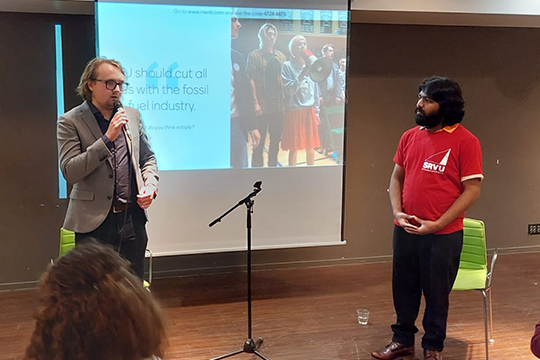The popularity of the student council elections has been dismal in recent years, with very few votes being cast. But you wouldn’t get that impression from the enthusiastic and crowd of around forty people that showed up to the debate on Tuesday April 11 in the main building. Even before the first of six debate topics was posed, lively political matters were being hashed out between members of the audience. “My pizza has been privatized!”, exclaims a student discussing the ins and outs of the snacks and drinks available.
The actual debate kicks off on a mild note. “Alcohol is the bread and butter for study associations”, says a ChangeVU candidate. “For internationals, it’s go home or go homeless”, an SRVU candidate says. The points of contention between the candidates are somewhat masked by the many times “I agree” is uttered. That changes when the topic of academic freedom is announced.
Bilingual debate
The frontrunner of the newly formed Vrijmoedige Studentenpartij (loosely translated to ‘outspoken student party’), Marlon Uljee, refuses to debate in English. “Guys, what is happening here is an example of the far-reaching internationalization”. He points out that he, the opposing candidate and the debate leader are all Dutch, so that is the language he will be sticking to. His comment is met with a hesitant applause, with international audience members unable to follow.
His opponent Guido Groenescheij responds that the SRVU party stands for inclusivity on many fronts, “including on the English language”, and receives the loudest applause of the evening. He explains that academic freedom is a core value of his party, but that there are limits to this freedom established by shared values, for instance when it comes to Nazi symbols or eugenics. “Debate is a beautiful thing, and overall it’s not in danger”, says Groenescheij.
‘Woke extremism’
Uljee continues saying that in the few months he has been at VU Amsterdam, he noticed a culture in which people are excluded, canceled or called fascist for sharing their views. He brings up Laurens Buijs: an UvA scientist who faced backlash after equating non-binary people to flat earthers and speaking out against ‘woke extremism’. According to Uljee, VU teachers privately told him they are now hesitant to teach freely in the way they see fit.
He also suggests that VU Pride is receiving unfair privileges from the university at the expense of others: “There is no VU Islam or VU Christianity”. Groenescheij rebuts: “VU Pride is creating a space for people who don’t have one yet.” And he emphasizes the importance of the student population’s ability to express themselves freely. After the passionate exchange, in which candidates continue to stick to different languages, the audience gets to pose questions. “Vizier op Links [an anti-left platform, Ed.] is targeting leftist scientists!”, says an audience member who agrees academic freedom is being threatened – just not by woke ideologies. But the moderator cuts this short, stating there’s no room for discussion between audience members and the USR candidates.
New parties
Uljee, who already gained some political experience as a candidate for right-wing political party Forum voor Democratie Almere, does not stand alone in the student council election. His newly formed Vrijmoedige Studentenpartij has no less than fifteen candidates running for a seat in the council, an amount equal to all the other candidates combined.
Another new party is the Liberale Universiteitspartij (liberal university party). Its sole member, Hidde Smid, took on the next topic of fossil fuel ties against SRVU’s Suvarn Nagan. Smid calls it naive to think the university should cut ties with fossil fuel companies. “If you want to improve the world, you have to interact with it and not stay in a bubble.” But Nagan believes that by continuing to work with the fossil fuel companies, the university inadvertently becomes closer to them and important changes are compromised. “Taking the brave act to cut ties with them shows that we will not tolerate their unethical existence.”
The evening is wrapped up debating hybrid education and ChatGPT. But when students take to the electronic polls next week, they may be more concerned about the candidates’ views on LGBTQ+ rights, academic freedom and fossil fuel ties as opposed to how willing they are to embrace ChatGPT. That is, if they cast a vote at all.
